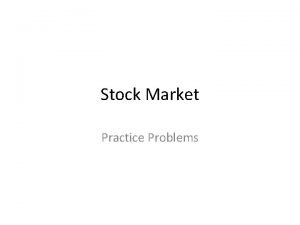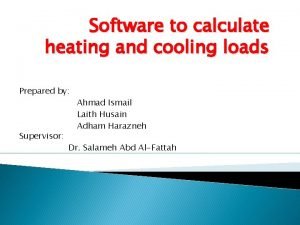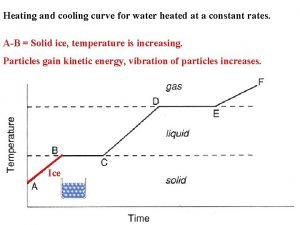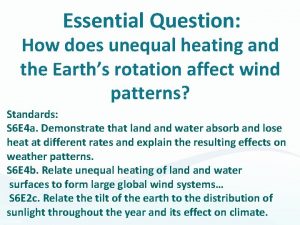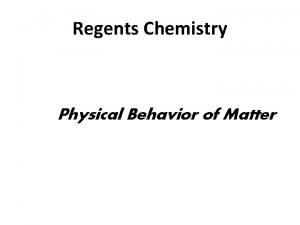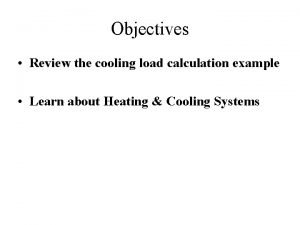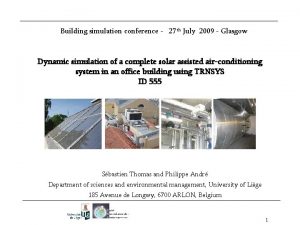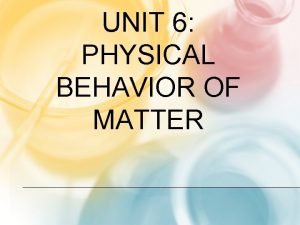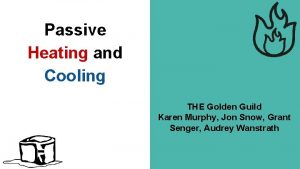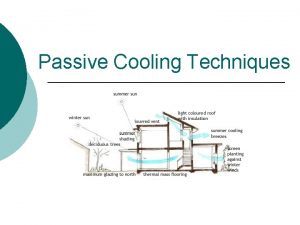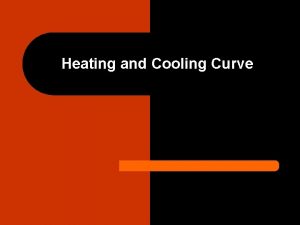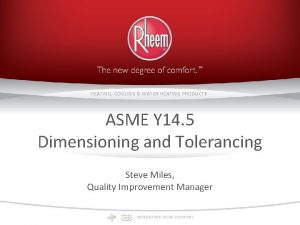Passive Heating and Cooling THE Golden Guild Karen











- Slides: 11

Passive Heating and Cooling THE Golden Guild Karen Murphy, Jon Snow, Grant Senger, Audrey Wanstrath

Introduction: ● Background ● Relevance to History ● Significance ● Challenges faced ● Future of this technology

Background: ● Passive heating and cooling is a building design ○ Focused on innovation ○ Utilizes indoor climate control with low energy consumption

Relevance to History: In Germany 70 million square meters (1995) to 230 million square meters (2005). Rain water concrete cistern cycle. Benefit : Temperature is more stable than the ambient air temperature Avoids contamination of water. (Kalz). Setback: Weather Dependant

Relevance to History: In America Solar Chimney Benefits Reliable Cost Effective Setbacks (Maerefat). Depends on Temperature Depends on Solar Energy

Why is it significant? ● Estimated savings around 70% when compared to traditionally air conditioned buildings (Santamouris, Mattheos, and Dionysia Kolokotsa) ● No decrease in the comfort conditions of the buildings (Orosa, José A. , and Armando C. Oliveira)

Where Passive Heating currently is? ● Many options when it comes to technologies that can be applied: ○ Permeable coverings (Orosa, José A. , and Armando C. Oliveira) ○ The use of the ground as a heat sink (Santamouris, Mattheos, and Dionysia Kolokotsa) ○ Night time ventilation ○ Special roof systems as thermal buffers (Wong, N. h. , and S. Li. ) ○ Building orientation, i. e. North-South in sunny climates ○ Increasing the thickness of the external wall on the sides with the most sun exposure (east and west) ○ Automated window shading

Challenges: ● High initial cost ● More difficult to achieve desired temperatures in extreme climates ● Cistern - Generated more heat in comparison to cooling. ● Difficult to incorporate multiple technologies for climates with changing seasons

Future of Passive Heating and Cooling: More passive heating and cooling technologies will be developed and researched It will be used to control the climate in most new buildings

Bibliography Chan, Hoy-Yen, Saffa B. Riffat, and Jie Zhu. "Review of Passive Solar Heating and Cooling Technologies. " Renewable and Sustainable Energy Reviews 14. 2 (2010): 781 -89. Web. Kalz, Doreen E. , Jan Wienold, Martin Fischer, and Davide Cali. "Applied Energy. " Science. Direct. German Federal Office for Building and Regional Planning, 26 June 2009. Web. 19 Sept. 2015. Maerefat, M. , and A. P. Haghighi. "Renewable Energy. " Science. Direct. Elsevier, 26 Mar. 2010. Web. 19 Sept. 2015. Orosa, José A. , and Armando C. Oliveira. "Energy Saving with Passive Climate Control Methods in Spanish Office Buildings. " Energy and Buildings 41. 8 (2009): 823 -28. Science. Direct. Web. 30 Sept. 2015. Santamouris, Mattheos, and Dionysia Kolokotsa. "Passive Cooling Dissipation Techniques for Buildings and Other Structures: The State of the Art. " Energy and Buildings 57 (2013): 74 -94. Science. Direct. Web. 30 Sept. 2015. Wong, N. h. , and S. Li. "A Study of the Effectiveness of Passive Climate Control in Naturally Ventilated Residential Buildings in Singapore. " Building and Environment 42. 3 (2007): 1395 -405. Science. Direct. Web. 30 Sept. 2015.

Questions?
 Karen heating and cooling
Karen heating and cooling Dielectric heating formula
Dielectric heating formula June's portfolio includes 177 shares
June's portfolio includes 177 shares Air conditioning heat load calculation software
Air conditioning heat load calculation software Heating and cooling curves
Heating and cooling curves Sea breeze
Sea breeze Frazier heating and cooling
Frazier heating and cooling Physical behavior of matter heating and cooling curves
Physical behavior of matter heating and cooling curves Heating and cooling load calculation example
Heating and cooling load calculation example Thermo bello
Thermo bello H&c heating and cooling
H&c heating and cooling Physical behavior of matter heating and cooling curves
Physical behavior of matter heating and cooling curves


